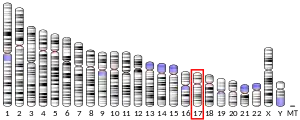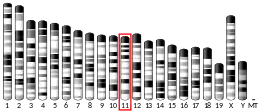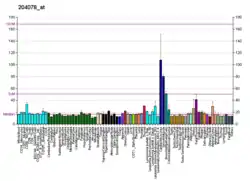SC65
Synaptonemal complex protein SC65, also known as Leprecan-like protein 4 (LEPREL4) or nucleolar autoantigen No55, is a protein that in humans is encoded by the LEPREL4 gene.[5]
| P3H4 | |||||||||||||||||||||||||||||||||||||||||||||||||||
|---|---|---|---|---|---|---|---|---|---|---|---|---|---|---|---|---|---|---|---|---|---|---|---|---|---|---|---|---|---|---|---|---|---|---|---|---|---|---|---|---|---|---|---|---|---|---|---|---|---|---|---|
| Identifiers | |||||||||||||||||||||||||||||||||||||||||||||||||||
| Aliases | P3H4, NO55, NOL55, SC65, LEPREL4, prolyl 3-hydroxylase family member 4 (non-enzymatic), prolyl 3-hydroxylase family member 4 (inactive) | ||||||||||||||||||||||||||||||||||||||||||||||||||
| External IDs | OMIM: 617419 MGI: 1913430 HomoloGene: 4713 GeneCards: P3H4 | ||||||||||||||||||||||||||||||||||||||||||||||||||
| |||||||||||||||||||||||||||||||||||||||||||||||||||
| |||||||||||||||||||||||||||||||||||||||||||||||||||
| |||||||||||||||||||||||||||||||||||||||||||||||||||
| |||||||||||||||||||||||||||||||||||||||||||||||||||
| Wikidata | |||||||||||||||||||||||||||||||||||||||||||||||||||
| |||||||||||||||||||||||||||||||||||||||||||||||||||
Function
This nucleolar protein was first characterized because it was an autoantigen in cases on interstitial cystitis. The protein, with a predicted molecular weight of 50 kDa, appears to be localized in the particulate compartment of the interphase nucleolus, with a distribution distinct from that of nucleolar protein B23. During mitosis it is associated with chromosomes.[5]
References
- GRCh38: Ensembl release 89: ENSG00000141696 - Ensembl, May 2017
- GRCm38: Ensembl release 89: ENSMUSG00000006931 - Ensembl, May 2017
- "Human PubMed Reference:". National Center for Biotechnology Information, U.S. National Library of Medicine.
- "Mouse PubMed Reference:". National Center for Biotechnology Information, U.S. National Library of Medicine.
- "Entrez Gene: SC65 synaptonemal complex protein SC65".
Further reading
- Foster LJ, Rudich A, Talior I, et al. (2006). "Insulin-dependent interactions of proteins with GLUT4 revealed through stable isotope labeling by amino acids in cell culture (SILAC)". J. Proteome Res. 5 (1): 64–75. doi:10.1021/pr0502626. PMID 16396496.
- Gerhard DS, Wagner L, Feingold EA, et al. (2004). "The status, quality, and expansion of the NIH full-length cDNA project: the Mammalian Gene Collection (MGC)". Genome Res. 14 (10B): 2121–7. doi:10.1101/gr.2596504. PMC 528928. PMID 15489334.
- Ota T, Suzuki Y, Nishikawa T, et al. (2004). "Complete sequencing and characterization of 21,243 full-length human cDNAs". Nat. Genet. 36 (1): 40–5. doi:10.1038/ng1285. PMID 14702039.
- Strausberg RL, Feingold EA, Grouse LH, et al. (2003). "Generation and initial analysis of more than 15,000 full-length human and mouse cDNA sequences". Proc. Natl. Acad. Sci. U.S.A. 99 (26): 16899–903. Bibcode:2002PNAS...9916899M. doi:10.1073/pnas.242603899. PMC 139241. PMID 12477932.
- Fosså A, Siebert R, Aasheim HC, et al. (2000). "Identification of nucleolar protein No55 as a tumour-associated autoantigen in patients with prostate cancer". Br. J. Cancer. 83 (6): 743–9. doi:10.1054/bjoc.2000.1365. PMC 2363543. PMID 10952778.
- Suzuki Y, Yoshitomo-Nakagawa K, Maruyama K, et al. (1997). "Construction and characterization of a full length-enriched and a 5'-end-enriched cDNA library". Gene. 200 (1–2): 149–56. doi:10.1016/S0378-1119(97)00411-3. PMID 9373149.
- Ochs RL, Stein TW, Chan EK, et al. (1996). "cDNA cloning and characterization of a novel nucleolar protein". Mol. Biol. Cell. 7 (7): 1015–24. doi:10.1091/mbc.7.7.1015. PMC 275955. PMID 8862517.
- Maruyama K, Sugano S (1994). "Oligo-capping: a simple method to replace the cap structure of eukaryotic mRNAs with oligoribonucleotides". Gene. 138 (1–2): 171–4. doi:10.1016/0378-1119(94)90802-8. PMID 8125298.
This article is issued from Wikipedia. The text is licensed under Creative Commons - Attribution - Sharealike. Additional terms may apply for the media files.




